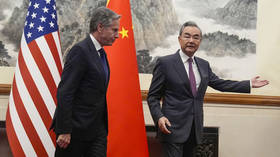Beijing warns Washington against crossing ‘red lines’

The US is challenging China’s core interests and suppressing the country’s development, Chinese Foreign Minister Wang Yi stated on Friday during talks with his US counterpart, Secretary of State Antony Blinken.
The “giant ship” of China-US ties had stabilized, “but negative factors in the relationship are still increasing and building,” Wang said during a meeting at the Diaoyutai State Guesthouse in Beijing.
Blinken arrived in Beijing on Thursday from Shanghai, where he urged the Chinese government to provide a level playing field for US firms in the country.
Bilateral ties face “all kinds of disruptions. China’s legitimate development rights have been unreasonably suppressed and our core interests are facing challenges,” Wang stressed.
Beijing and Washington could either engage in cooperation or confrontation, the foreign minister warned.
China is interested in “stable, healthy, and sustainable” relations and “win-win cooperation” with the US, he pointed out.
In order for it to continue, however, Washington should not interfere in Chinese internal affairs or cross Beijing’s ‘red lines’ when it comes to the nation's sovereignty, security and development, he stressed.
The foreign minister was apparently referring to the tensions around Taiwan, which Beijing views as a Chinese province. Despite agreeing with the ‘One China’ policy on paper, the US maintains ties with the self-governing island and supplies Taipei with weapons.
Blinken told Wang that “there's no substitute in our judgment for face-to-face diplomacy” between the two countries. The administration of US President Joe Biden wants to ensure that “we're as clear as possible about the areas where we have differences, at the very least to avoid misunderstandings, to avoid miscalculations,” he said.
Ahead of Blinken’s trip, US State Department officials indicated that China’s alleged support for Russia amid the conflict in Ukraine will top the agenda during his meetings with Chinese officials. Beijing hasn’t supplied any weapons to Moscow, but US officials claim that Chinese-made circuitry, aircraft parts and machine tools have been helping Russia boost its military industrial capacity.
The Wall Street Journal reported earlier this week, citing informed sources, that the US authorities are preparing sanctions that would not only target Chinese companies, but would also cut off some of the country’s banks from the global financial system.













